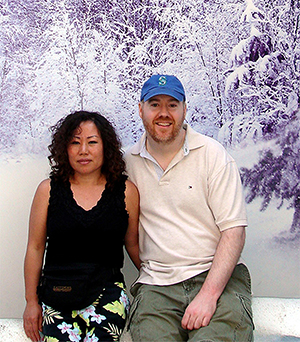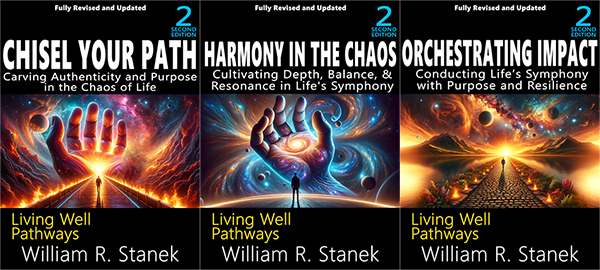

Living Well: Daily Habits and Practices
A fulfilling life is built on small, daily actions. In this series, William and Hui Cha Stanek share their insights on cultivating meaningful habits—from morning routines to simple practices that enhance well-being—helping you live with purpose and balance.

Transform your life with practical wisdom. Discover William Stanek's 'Living Well' series—your guide to a balanced and fulfilling life.
Discover William Stanek's Exclusive Art Collection
Explore and purchase the stunning art featured on this site. Own a piece of William Stanek's unique and captivating artwork today!
(May 1, 2025) The Power of Daily Reflection: Journaling for Personal Growth
In the fast-paced world we live in, finding time to pause and reflect can seem like a luxury. But for William and Hui Cha Stanek, daily journaling has been much more than a momentary escape—it’s been a lifeline. Through the simple act of writing, they’ve found a powerful tool for growth, healing, and creative expression. Journaling has allowed them to navigate life’s complexities, process trauma, and continuously evolve as individuals and as a couple.
This article explores how journaling became a cornerstone of the Staneks’ lives and offers practical insights into how you can use this practice to foster your own personal growth. By sharing their journey, we hope to inspire you to pick up a pen and start writing your own story.
Journaling as a Lifeline: How William Used Writing to Process Trauma and Growth
For William, journaling has always been more than just putting thoughts on paper—it’s been a way to process some of the most challenging experiences of his life. From the trauma of war to the struggles of post-military life, writing has been a constant companion, helping him make sense of his experiences and find a path forward.
1. Writing Through the Darkness: Processing Trauma
William’s journey with journaling began during his military service. The intensity of combat, the uncertainty of each day, and the emotional toll of his experiences left him searching for a way to cope. Journaling became that outlet—a safe space where he could explore his thoughts and emotions without judgment.
Writing allowed William to confront the pain and trauma he carried, giving him a way to process what he had been through. In those quiet moments with pen in hand, he could pour out his fears, his grief, and his hopes, gradually untangling the complex web of emotions that had built up inside him. This process was crucial in helping him heal and find strength in the aftermath of war.
2. A Tool for Growth: Reflecting on Life’s Lessons
Beyond processing trauma, journaling became a tool for growth. William used his journal to reflect on the lessons life had taught him—both in and out of the military. Whether it was a challenge he had overcome, a mistake he had learned from, or a moment of clarity, he recorded it all.
These reflections allowed William to see patterns in his life, to understand his strengths and weaknesses, and to set goals for the future. Journaling wasn’t just about looking back—it was about looking forward, using the insights gained from past experiences to guide his future actions. This practice of daily reflection became a key part of his personal and professional development.
The Healing Power of Reflection: Hui Cha’s Approach to Daily Journaling
While William’s journaling journey was shaped by his need to process trauma, Hui Cha’s approach to writing has been deeply rooted in reflection and healing. For her, journaling is a way to connect with her inner self, to explore her emotions, and to find peace in the midst of life’s chaos.
1. Journaling as a Form of Self-Care
For Hui Cha, daily journaling is an act of self-care. It’s a time when she can slow down, tune out the noise of the world, and focus on her thoughts and feelings. Whether she’s writing about her day, exploring her dreams, or simply reflecting on how she feels in the moment, journaling helps her stay grounded and connected to herself.
This practice became especially important during difficult times, such as when she experienced multiple miscarriages. Writing allowed Hui Cha to express her grief, to process the pain, and to begin the journey toward healing. Her journal became a sanctuary—a place where she could be completely honest with herself, free from the expectations of the outside world.
2. A Journey of Self-Discovery
Journaling has also been a tool for self-discovery for Hui Cha. Through writing, she’s been able to explore her identity, her values, and her beliefs. It’s a way for her to understand who she is and what she wants out of life.
By regularly reflecting on her experiences and emotions, Hui Cha has gained a deeper understanding of herself. This self-awareness has been empowering, helping her navigate life’s challenges with greater clarity and confidence. Journaling has allowed her to not only heal but also to grow, becoming more attuned to her needs and desires.
How to Start a Journaling Habit: Lessons from the Staneks’ Personal Practices
If you’re inspired by the Staneks’ journaling journey and want to start your own practice, here are some lessons from their experiences that can help you get started:
1. Start Small and Be Consistent
One of the most important aspects of journaling is consistency. William and Hui Cha both started their journaling habits by setting aside just a few minutes each day to write. They didn’t put pressure on themselves to write pages and pages; instead, they focused on making journaling a regular part of their routine, no matter how much or how little they wrote each day.
If you’re new to journaling, start small. Set aside five to ten minutes each day to write, and focus on building the habit. Over time, you may find that you naturally want to write more, but the key is to make journaling a consistent practice in your life.
2. Write Without Judgment
Journaling is a personal practice, and there’s no right or wrong way to do it. The Staneks both emphasize the importance of writing without judgment. Don’t worry about grammar, spelling, or whether your thoughts make sense. The goal is to express yourself honestly and freely, without censoring your thoughts.
By letting go of judgment, you can create a safe space in your journal where you can explore your thoughts and emotions without fear. This openness is essential for using journaling as a tool for personal growth.
3. Use Prompts to Get Started
Sometimes, the hardest part of journaling is knowing where to begin. When William or Hui Cha felt stuck, they often turned to journaling prompts to get their thoughts flowing. Prompts can be a great way to spark inspiration and help you dive deeper into your reflections.
You can use prompts related to your current experiences, emotions, or goals. For example, you might start with questions like, “What am I grateful for today?” or “What challenges did I face this week, and how did I overcome them?” Prompts can guide your writing and help you explore new perspectives.
Real-Life Examples: The Impact of Daily Journaling on the Staneks’ Lives
The impact of daily journaling on William and Hui Cha’s lives has been profound. Here are a few real-life examples of how this practice has shaped their journeys:
1. William’s Creative Process
For William, journaling has been instrumental in his creative work. As a writer, he uses his journal to brainstorm ideas, develop characters, and explore themes for his books. But beyond the creative process, journaling has helped him stay focused and motivated, especially during challenging times.
When William faced writer’s block or struggled with self-doubt, journaling allowed him to work through these obstacles. By writing about his fears and frustrations, he was able to gain clarity and find solutions, ultimately allowing him to continue creating.
2. Hui Cha’s Healing Journey
For Hui Cha, journaling has been a powerful tool for healing. During times of grief and loss, her journal provided a space where she could express her emotions and process her experiences. Writing helped her navigate the complex feelings that came with her miscarriages, allowing her to find peace and move forward.
Through journaling, Hui Cha was able to reflect on her journey, recognize her strength, and embrace the healing process. This practice has been an essential part of her self-care routine, helping her maintain emotional well-being and resilience.
Call to Action: Start Your Journaling Journey
Inspired by the Staneks’ experiences, we encourage you to start your own journaling practice. To help you get started, here’s a journaling prompt inspired by William and Hui Cha’s journey:
Journaling Prompt: “Reflect on a recent challenge or difficult experience. What emotions did you feel, and how did you navigate them? What lessons did you learn from this experience, and how can you apply those lessons moving forward?”
Take a few minutes each day to write in response to this prompt, and see where your thoughts take you. Whether you’re processing a recent event, reflecting on your growth, or exploring your goals, journaling can be a powerful tool for personal development.
Share your journaling journey with us using the hashtag #WriteWithTheStaneks. Let’s create a community of individuals committed to growth, healing, and self-discovery through the power of journaling.
Conclusion: The Transformative Power of Daily Journaling
For William and Hui Cha Stanek, journaling has been a transformative practice—one that has helped them process trauma, heal, and grow both individually and together. Their journey with journaling offers a powerful example of how this simple daily practice can have a profound impact on our lives.
By embracing journaling as a tool for reflection, you can navigate life’s complexities with greater clarity, connect with your inner self, and foster continuous personal growth. Whether you’re facing challenges, pursuing creative endeavors, or simply seeking to understand yourself better, the pen can be a powerful ally.
So, pick up your journal, start writing, and let the journey of self-discovery begin. Because sometimes, the most profound transformations come from the quiet moments we spend with ourselves, reflecting on the pages of our own story.

Join William at the crossroads of technology, business, and leadership, where true influence isn't about titles - it's about inspiring action, driving change, and guiding others with integrity. Discover how authentic leadership can transform not just careers, but entire industries.
Bring Inspiration Home
Enhance your space with William Stanek's evocative art. Each piece is crafted to inspire and uplift your everyday life.

Support The Lights of Paris by Robert Stanek, William Stanek's pen name! Through vivid historical detail and deeply moving character stories, Robert takes readers on an unforgettable journey through one of history’s most transformative times.

















